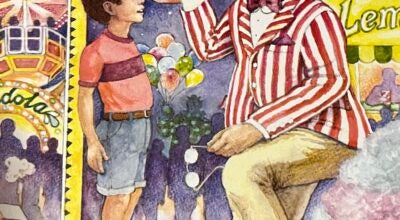Still Wrestling: Les Ferguson Jr. on the path to healing
Published 10:30 am Sunday, August 5, 2018
Les Ferguson Jr. describes himself as a “broken guy,” as broken as anyone else.
The reason for that brokenness, and his pathway to redemption, is detailed in Ferguson’s new book, “Still Wrestling: Faith Renewed through Brokenness.”
“My brokenness came through different ways than a lot of people experience,” Ferguson said. “But my story is a story of ministry, a story of a loss of a wife and a son to a murder, and mine is a story of fighting my way back to a bigger, better, stronger, more vibrant faith.”
The son of a preacher, a Navy veteran, Church of Christ minister, husband and father, he explained that his life had essentially gone along swimmingly – that is, until Oct. 10, 2011. On this day, Ferguson returned to his Pascagoula, Miss. home to find his wife, Karen, and 21-year-old son Cole, who had cerebral palsy, slain at the hands of someone the family once trusted.
Three months before, Cole had revealed that the 70-year-old man who had been hired by the family as an in-home caretaker for a few hours every Wednesday, had raped him. Not once, but multiple times. The Fergusons pressed charges against the man, who’d repeatedly told Cole he would kill him and his family if he told anyone what happened.
True to his word, the rapist charged into the Ferguson’s home on Oct. 10, 2011 and killed both Karen and Cole in cold blood. Les was out of the house at the time. Their eldest son, Kyle, was living in Kentucky and starting a ministry with his wife. Their middle son Conner, 14 at the time, was playing mini golf with his youth group. Casey, only 5 years old, managed to escape the home and run to a neighbor for help, but it’s still unclear how much of the horror he witnessed.
In the aftermath of the incident, Ferguson left ministry and became a real estate agent on the Mississippi Gulf Coast. He said he was angry and hurt for a long time, but in the midst of this pain found solace in blogging.
“The book really came out of blogging, and blogging was really an answer to pain. I kind of used it to process what had happened,” Ferguson said. “I wrote a lot early on, on the blog. It was pretty raw, tough stuff, and that just drew me into wanting to write a book.”
“Still Wrestling” is part memoir, part Bible study, with Ferguson acknowledging his personal truth and the truth of his life, while also examining the truth of the Bible and its characters.
The book takes what he calls a “sideways look at scripture,” examining the trials of Biblical figures such as Abraham, Isaac, Rahab, the Josephs of the New and Old Testaments and Hagar. In doing so, Ferguson said he hopes to show readers that, just like people in the present-day, these characters faced similar struggles, too.
“I think sometimes, we’re predisposed to look at the Bible with a very flat, kind of two-dimensional look, and we never stop to look at what’s behind the story,” Ferguson said. “They’re all flawed, broken in some way. Take Abraham, for instance. God tells him to go to a foreign country and we read the scripture as if God said, ‘Go,’ and Abraham said, ‘Goody, goody, let’s do it.’”
Ferguson explained that people never stop to think about the questions people like Abraham had, the doubts and fears he had, even when he did what God called him to do. At the end of the day, he said, it made him realize he wasn’t alone in his thoughts.
Although he admits that he avoided scripture for a long time after the murders, Ferguson said he returned with fresh eyes. Examining stories like Joseph’s imprisonment in Egypt, and the dreams he had, allowed Ferguson to examine the ways his own dreams had not been fulfilled the way he thought they would.
The chapter on Hagar, he said, was especially difficult and cathartic to write. The chapter, titled
“Forlorn and Forgotten,” begins in the midst of Abraham’s banishment of Hagar and Ishmael (Genesis 21:15-17). Hagar is wandering through the wilderness, and gets to a point where she’s ready to give up, not unlike Ferguson’s own faith journey, he said.
“This is a passage that says, ‘Discarded, cast off, deserted, dumped. Can you imagine how Hagar and Ishmael might have felt, wandering alone in the desert? Can you imagine the fear of abandonment? Can you imagine the terrifying pain of ‘What do I do next’? Can you imagine the gut-wrenching moment when it seemed all was lost? Can you imagine Hagar in the moment she recognized her inability to save her son?’” Ferguson read. “That kind of encapsulated where I had been.”
While it’s hard to fathom from the outside, Ferguson said his story isn’t completely a tragedy. In the years since his wife and son were murdered, he began rebuilding his life with the help of his second wife, Becki. Ferguson returned to the pulpit, and can now be seen every Sunday as the new minister at Oxford Church of Christ.
“I hope that people will see me, not as a stiff theologian who is kind of above the fray, but the guy who’s been down in the dirt and the mud just like they may have been,” he said. “I’m not the guy on the pedestal. I may have been that guy at one point, at least in my mind. But when the pedestal is knocked out from under you, so to speak, you realize you’re just like everyone else.”
To learn more or purchase a copy of “Still Wrestling: Faith Renewed through Brokenness,” visit http://lesfergusonjr.com.





